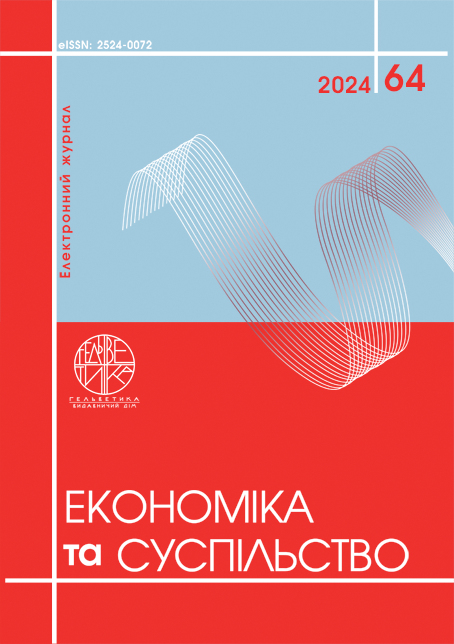ORGANIZATIONAL STRUCTURE OF CORPORATE PARTNERSHIP CENTER MANAGEMENT TAKING INTO ACCOUNT THE PRINCIPLES OF SUSTAINABLE DEVELOPMENT
Abstract
The outcomes of this research possess significant potential to be harnessed by industrial enterprises aiming to implement efficacious personnel management strategies that meticulously consider the exigencies of the contemporary business milieu. An enhancement in productivity, facilitated by the adoption of novel approaches to personnel management delineated in this study, will consequently augment the overall potential of the enterprise. The study elucidates methodologies through which businesses can cultivate an environment that fosters employee development and motivation, thereby engendering a more robust and dynamic workforce. The findings of this research are instrumental in aiding companies to comprehend the integration of sustainable development principles within their personnel management strategies. Industrial enterprises will be empowered to establish conditions conducive to fostering creativity and innovation among their workforce, thereby driving the enterprise towards sustained growth and competitive advantage. This scholarly article thus emerges as a pivotal resource for managers, human resource professionals, and other managerial personnel who are tasked with the intricate responsibility of managing human capital in their respective organizations. The elucidated problem serves as the foundation upon which the primary objective of this article is constructed, which is to investigate and formulate innovative approaches to personnel management that are attuned to the requisites of modern enterprises. This encompasses the development of strategies and methodologies that not only incentivize development but also facilitate the implementation of sustainable development principles. The proposed findings are geared towards elucidating how these novel approaches can assist in the identification and retention of employees with an entrepreneurial mindset by affording them ample opportunities for creativity and innovation. In furtherance of this objective, the article delves into a comprehensive analysis of contemporary personnel management theories, juxtaposing them with empirical data to derive actionable insights. The synthesis of theoretical constructs with practical observations provides a nuanced understanding of the dynamic interplay between personnel management and organizational performance. This rigorous analytical approach ensures that the proposed strategies are not only theoretically sound but also practically viable, thereby enhancing their applicability in real-world scenarios. Furthermore, the article accentuates the critical role of leadership in driving the successful implementation of these personnel management strategies. It underscores the importance of transformational leadership in cultivating a culture of continuous improvement and innovation within the organization. Leaders who are adept at inspiring and motivating their teams are pivotal to the successful adoption of these new approaches, as they can effectively champion the cause of sustainable development and employee empowerment. In addition to leadership, the article explores the significance of technology in modern personnel management. It posits that leveraging advanced technological tools and platforms can significantly enhance the efficiency and effectiveness of personnel management practices. By automating routine tasks and providing data-driven insights, technology can free up human resource professionals to focus on more strategic initiatives, thereby driving greater value for the organization. The research also highlights the importance of fostering a supportive and inclusive organizational culture. It argues that a culture that values diversity, equity, and inclusion is essential for promoting creativity and innovation. Such a culture not only enhances employee satisfaction and engagement but also drives better business outcomes by harnessing the diverse perspectives and ideas of the workforce. In conclusion, this article presents a comprehensive framework for industrial enterprises to reimagine their personnel management strategies in light of contemporary challenges and opportunities. By integrating sustainable development principles, leveraging technology, and fostering a supportive organizational culture, enterprises can enhance their productivity and innovation capacity. The insights and recommendations provided in this article serve as a valuable resource for managers and human resource professionals seeking to navigate the complexities of modern personnel management and drive sustainable growth for their organizations.
References
О.С. Квілінський «Організаційне забезпечення управління розвитком промислового підприємства на прикладі діючої організаційної структури управління», Науковий погляд: економіка та управління, №2 (68) 2020 рік. – 134-137 с.
Т.О. Кобєлєва «Організаційна структура комплаєнс на промисловому підприємстві», Вісник НТУ «ХПІ» №47 (1323) 2018 – 71-73 с.
В.А. Рябцев «Корпоративне партнерство як форма реалізації концепції сталого розвитку компанії», International Science Journal of Management, Economics & Finance, 2023, 2(2): 124-132,
https://isg-journal.com/isjmef/article/view/381
Січко Т.В. Прикладні аспекти розрахунку структурно-топологічних характеристик систем /Т. В. Січко, К.В. Смоктій, А.О. Ткачук // Системи та технології. – 2019. – № 1 (57). – С. 141–153.
И.И. Коваленко, Е.С. Пугаченко, Л.С. Чернова, Е.А. Антипова // Управління розвитком складних систем. – 2015. – № 22. – С. 61–68.
Наумова О. Вдосконалення організації інноваційної діяльності персоналу в контексті підвищення конкурентоспроможності підприємства. Україна: аспекти праці. 2010. № 4. С. 47–51.
Чумаченко Н.Г., Савченко О.П, Корєнєв В.Г. Проектування організаційних структур управління виробництвом: моногр. Київ: Наукова думка, 1979. C. 258.
1. O.S. Kvilinsky "Organizational support for the management of the development of an industrial enterprise on the example of the current organizational structure of management", Scientific view: economics and management, No. 2 (68) 2020. - 134-137 p.
T.O. Kobeleva "Organizational structure of compliance at an industrial enterprise", Bulletin of NTU "KhPI" No. 47 (1323) 2018 - p. 71-73.
V.A. Riabtsev "Corporate partnership as a form of implementation of the concept of sustainable development of the company", International Science Journal of Management, Economics & Finance, 2023, 2(2): p. 124-132,
https://isg-journal.com/isjmef/article/view/381
Sichko T.V. Applied aspects of calculation of structural and topological characteristics of systems /T. V. Sichko, K.V. Smoktiy, A.O. Tkachuk // Systems and technologies. – 2019. – No. 1 (57). - p. 141–153.
I.I. Kovalenko, E.S. Pugachenko, L.S. Chernova, E.A. Antipova // Management of development of complex systems. – 2015. – No. 22. – P. 61–68.
Naumova O. Improving the organization of innovative personnel activities in the context of increasing the competitiveness of the enterprise. Ukraine: aspects of work. 2010. No. 4. P. 47–51.
Chumachenko N.G., Savchenko O.P., Korenev V.G. Designing organizational structures of production management: monogr. Kyiv: Naukova dumka, 1979. p. 258.

This work is licensed under a Creative Commons Attribution 4.0 International License.


